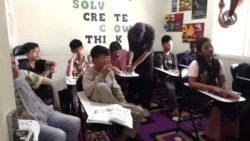How Indonesia is helping refugees from Asia and Africa prepare for the future.
Welcome to VOA Asia Weekly. I'm Chris Casquejo in Washington. That story is just ahead, but first, making headlines:
China and Russia conducted a joint naval exercise in the South China Sea this week. Each country deployed at least three vessels for the three-day exercises. Russian state media says both countries engaged in live artillery firing, joint air defense and anti-submarine drills. The U.S. Navy also announced that on Wednesday, American and Philippine coast guard cutters conducted joint training in the same sea.
Taiwan's Premier Cho Jung-tai said on Wednesday, the self-ruled island is committed to bolstering its own defenses.
“We are willing to take on more responsibility; we are defending ourselves.”
His response comes after former US President Donald Trump told Bloomberg Businessweek that Taiwan should pay the United States for its defense.
Thai police found traces of cyanide in the blood of six people found dead on Tuesday at a luxury hotel in Bangkok. Thai authorities said on Wednesday that one of them is believed to have poisoned the others over a bad investment. All six were of Vietnamese descent. Two of them were U.S. citizens.
Bangladesh deployed border guard troops Tuesday after more than five university students were killed in protests. The demonstrations began after the government reinstated quotas on government jobs and shut down most schools and colleges indefinitely.
Khadga Prasad Oli, the leader of Nepal’s largest communist party, took the oath of office on Monday as Nepal’s newly appointed prime minister. The event took place in a ceremony in Kathmandu following the collapse of a previous coalition government.
Indonesia has become a temporary home for thousands of refugees from Asia and Africa. VOA’s Dave Grunebaum reports from Cisarua, Indonesia, on a program that is helping some of them prepare for the lives that lie ahead of them.
“Mercury is a planet. It has an atmosphere, what is the name of the atmosphere?”
In these classrooms in Cisarua, Indonesia, 85 young refugees learn subjects from science to English to math.
“Five times eight? 40! Six-times eight? 48”
Academically qualified students can even join an online program and work towards a U.S. high school diploma.
It’s happening at the Cisarua Refugee Learning Center. Cisaura is a few hours drive from Indonesia’s biggest city, Jakarta, and hosts about 1300 refugees, according to the United Nations refugee agency.
Afnaan Guleid is a 13-year-old whose family fled Somalia. She says her family worried about violence back in their homeland. But here, she can focus on her dreams.
“I want to be a scientist when I grow up because I love to do experiments and discover things by myself.”
The facilities are very basic. This learning center is funded entirely from private donations, mostly from international donors. All of the teachers are volunteers, and many are refugees themselves.
Students and their families fled violence or persecution in countries in Asia and Africa.
“Students from different cultures. Students from different religions. Students from different countries. When they come here, I’m sure there is a diversity of culture here.”
Zahra Sakhawat is a 12-year-old student from Afghanistan. She says this learning center builds a sense of community.
“The community is very good because everyone is very kind and dear with each other.”
The United Nations refugee agency says that currently, the United States, Canada, Australia and New Zealand are accepting refugees who are staying in Indonesia but the process typically takes at least seven years and placement is not guaranteed.
While Indonesia allows refugees to enroll in public schools, the Cisarua Refugee Learning Center offers its students a chance to focus on their English which is a skill they’ll need if they’re resettled.
“We are trying to prepare them for the next country that they are going.”
The Cisarua Refugee Learning Center opened a decade ago and has become a model for similar refugee programs that have started elsewhere in the country to help young refugees prepare for the future.
Dave Grunebaum, VOA News, Cisarua, Indonesia.
Visit voanews.com for the most up-to-date stories.
I’m Chris Casquejo.
Finally, scientists say one of the rarest whales in the ocean has washed on shore in New Zealand.
The 16-foot carcass appears to be that of a Spade-toothed whale. So far, no live sightings have ever been recorded. The specimen has been frozen, allowing scientists to dissect it for the first time. With that data, they expect to learn what they eat, and perhaps find out where they live.
Thanks for watching VOA Asia Weekly.











